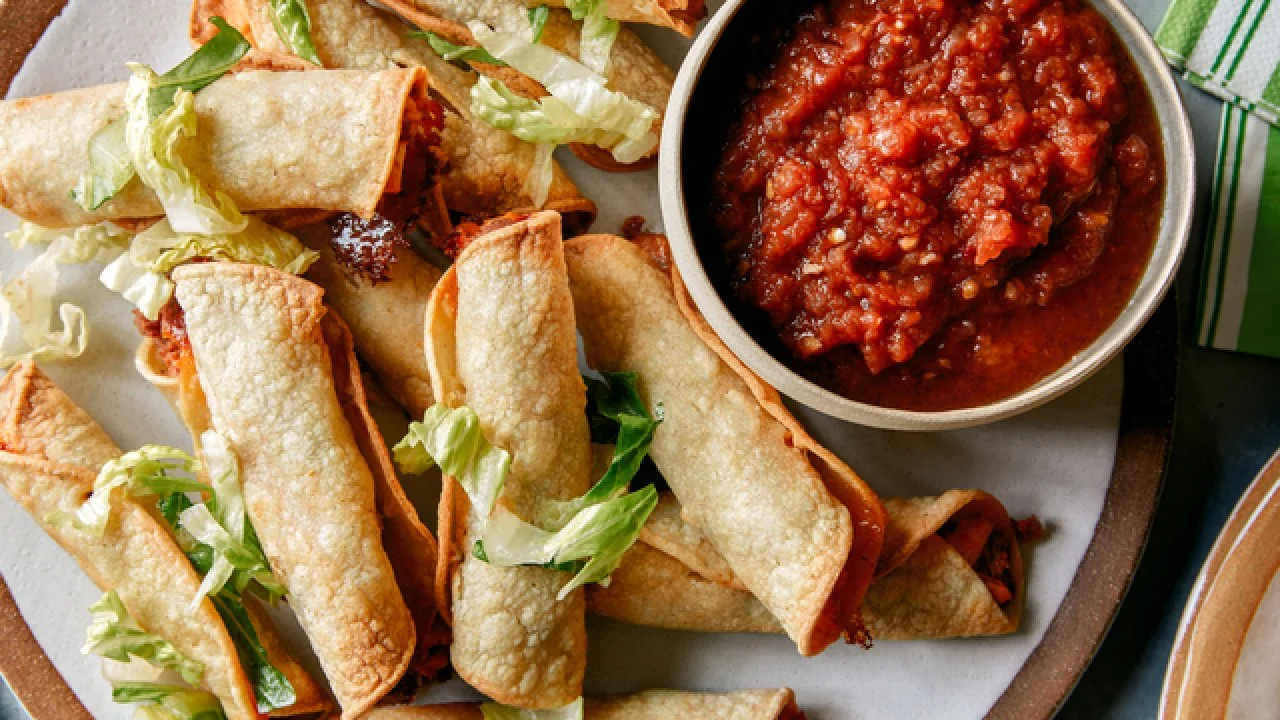TV Schedule
Here's your complete guide to everything that's airing on Cooking Channel this week.
To find saved recipes, click on the bookmark icon in the upper right corner of the page. For help, see our FAQ.
Carnival Eats
Ready for a food-frenzied roller coaster of culinary delights? We're headed to the new epicenter of carnival life: food!
More Inspiration

Latest Stories
We Asked 15 Cookbook Authors What Recipe They’d Bring to a Cookbook Club
They got to pick one of their own and one from a friend. If you're looking for quick inspiration for your first cookbook club meet …
5 Tips for Preserving Your Family Recipes for Generations
Passing down your favorite dishes doesn’t have to be difficult.
Why Greece Grows Grapes Into Baskets
You won’t be frolicking through tall rows of grape vines here.
Is It Okay to Thaw Food On the Counter?
Quick stat: in as little as 20 minutes, certain types of bacteria double in food left at room temperature. Even if the food is fro …
How To Throw a Taiwanese Night Market Party at Home
A variety of grazing dishes, food stations and twinkly lights translate the energy of a night market for a magical evening.
Pecan Milk Is the Perfect Mix-In for Warm Fall Beverages
It has the same rich flavor that makes pecans the star of butter pecan ice cream and pecan pie.
The Jewel-Like Mooncakes That Gleam in Sunlight
Traditional mooncakes are labor intensive. But jelly mooncakes, a modern take on the Mid-Autumn Festival treat, require only a fra …
Why You Should Put Orange Juice In Your Guacamole
Restaurant worthy guac, straight ahead.
Why You Should Keep White Lambrusco In Your Fridge All Summer Long
According to a somm, this cool kid wine is light, low-alcohol and pairs well with pizza.
Why You Should Have Your Burger on an English Muffin
The best way to savor a decadent, juicy burger has nothing to do with the patty.
The One Secret to the Best Roasted Veggies Ever
This tip takes no extra time at all. It makes veggies so crispy you’ll eat them like potato chips.
The Fiery Fried Chicken That Will Help You Beat the Summer Heat
Amped up with hot chilies and fragrant spices, Chicken 65 a.k.a. Indian fried chicken, will bring flavor-packed, sweat-inducing de …
For Jacques Pepin and His Family, Menus Are the Most Sacred Memories
When his daughter Claudine asked him if he knew what she’d eaten on her fourth birthday, he said he couldn’t remember, but that th …
The 3 Hors D'oeuvres That Solved Our Biggest Dinner Party Problem
Now when everyone arrives, you’ll be calmly sipping some wine.
Missing Your Local Red Lobster? Try These Recipes Instead
Make your favorite menu items at home with these dupes, copycats and more Red Lobster-inspired dishes.
My New Favorite Cocktail Has Grilled Banana In It
The flavors of a negroni meet bananas foster. Here’s how to make it at home.
How to Make Exactly One Cupcake from a Box of Cake Mix
Swap the egg for this secret pantry ingredient.
I Promise Making Your Own Paneer Is Worth It, and It’s Way Easier Than You Think
Yes, I make cheese from scratch, and so should you!
Love Hot Pot? Have You Met Its Lesser-Known Cousin?
Dry pot’s got all the customizability of hot pot, minus the soupy broth.
What to Do with Overripe Bananas
Beyond banana bread, there are so many ways to capture ripe bananas' intense natural sweeteness.
For a Sweet, Spicy and Sour Punch of Flavor, Just Add Achar
Earthy spices and a days-long fermentation process give this popular pickled Indian condiment its tangy bite. Here are some ways t …
It Takes Two to Make This Bouncy Lunar New Year Dessert – No, Seriously
Lauren Tran, the pastry chef behind Bánh By Lauren — a Vietnamese American bakery worth waiting in line for — shares why you need …
What To Make with Common Food Scraps, According to Max La Manna
The low-waste chef and cookbook author has savvy ideas for things many of us wouldn’t think twice about throwing out.
Sweet or Savory, Lassi Is a Year-Round Refresher
A cold, creamy blend of yogurt, water and spices, this traditional Indian drink soothes the palate and the soul.
If You Love ‘The Gilded Age,’ Bring This Cookie to Your Swap
Bonus: This historic treat only has 3 ingredients.
Does Diamond’s New Fine Baking Salt Actually Yield Better Cookies?
We tested it against standard table salt; here’s how our test batch of chocolate chip cookies compared.
I Tried Donna Kelce’s Go-To ‘Dinner Rolls’ Recipe
NFL star Jason Kelce says they’re "the only thing" he wants at Thanksgiving.
This Flan’s Secret Ingredient Is 80 Years of Friendship
Cristi Diez’s grandmother’s best friend’s recipe is special — and might just be the best you’ll ever taste.
Klancy Miller’s ‘For the Culture’ Celebrates and Magnifies Black Women and Femmes in Food
In her second cookbook, Klancy Miller celebrates Black women and femmes in food through recipes, interviews and stunning visuals.
How Indian Chefs and Hospitality Pros Are Celebrating Diwali
These tastemakers ring in the Festival of Lights with time-honored family recipes, epic dessert platters, fine wine and more.














































_Trevor%20Clarke,%20Clarkbourne%20Creative.jpg.rend.hgtvcom.231.174.85.suffix/1715704866658.webp)



































































